As a defense contractor familiar with CMMC, you’re likely encountering a flood of contradictory information about who can help you, what services you actually need, and whether you even need external assistance at all. The market for CMMC Services is saturated with consultants making conflicting claims or promising services they can’t legally provide, and well-meaning cybersecurity professionals who may not explain the critical distinctions between compliance preparation and certification assessment.
The confusion is understandable—CMMC involves multiple professionals with overlapping credentials but distinct roles, strict independence requirements that prevent certain organizations from providing both services to the same client, and a timeline that creates pressure to make decisions quickly. Adding to the complexity, many professionals hold multiple credentials (RP, RPA, CCP, CCA, etc.) but are restricted in how they can use these them depending on their organizational affiliations and client relationships.
This blog cuts through the confusion by clearly explaining who can legally help with what aspects of CMMC, when you need each type of professional, and why the same qualified expert cannot help you with both compliance preparation and certification assessment—even if they’re trained and authorized to do both. You need to ensure you have a partner that can help you avoid the common critical pitfalls and help you prepare for certification.
The Evolution from DFARS to CMMC: Why This Transition Matters
The DFARS self-attestation model under clause 252.204-7012 proved inadequate, with DoD audits finding only 10-15% actual compliance requirements were despite contractor self-reporting protocols. CMMC addresses these gaps by requiring third-party verification through authorized assessors and introducing a tiered approach based on information sensitivity. The CMMC Program Final Rule became effective December 16, 2024, with contract requirements expected to begin in Q3 2025.
How CMMC is Different
CMMC is fundamentally different from traditional compliance frameworks. It combines cybersecurity standards with a maturity model approach, creating a structured pathway for organizations to enhance their cybersecurity posture progressively. This framework recognizes that cybersecurity is not a destination but a journey of continuous improvement.
The model addresses three critical components that previous frameworks often treated separately: cybersecurity practices, processes, and people. This holistic approach ensures that organizations don’t just implement technical controls but also develop the organizational maturity necessary to maintain and evolve their cybersecurity posture over time.
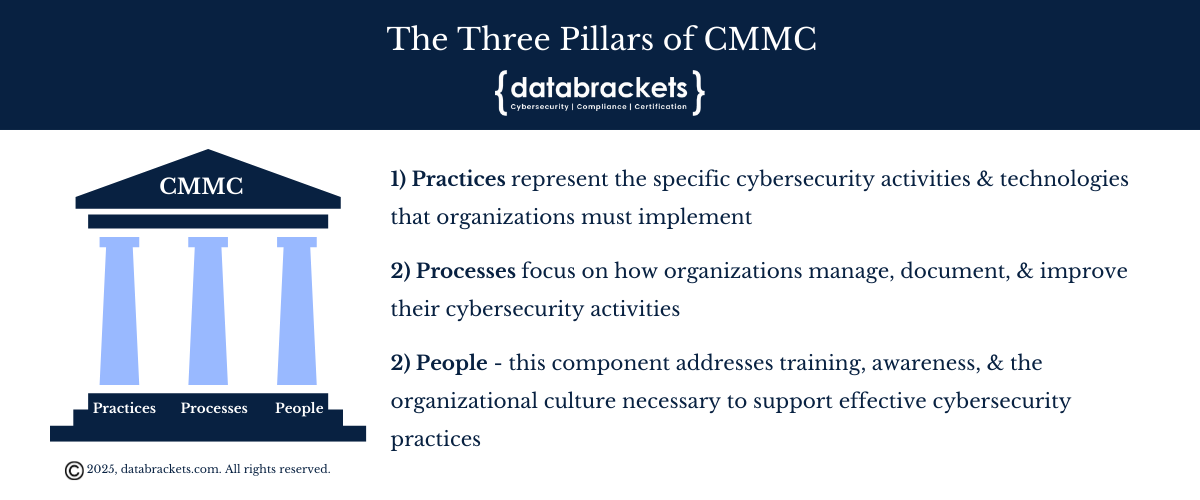
The Three Pillars of CMMC
1. Practices represent the specific cybersecurity activities and technologies that organizations must implement. These align closely with established frameworks like NIST SP 800-171 but are organized in a way that supports progressive implementation and maturation.
2. Processes focus on how organizations manage, document, and improve their cybersecurity activities. This includes everything from incident response procedures to risk management frameworks. The process component ensures that cybersecurity practices are sustainable and can evolve with changing threats.
3. People acknowledges that cybersecurity is ultimately a human endeavor. This component addresses training, awareness, and the organizational culture necessary to support effective cybersecurity practices. It recognizes that even the best technical controls can fail without proper human oversight and engagement.
CMMC Levels and Their Strategic Implications
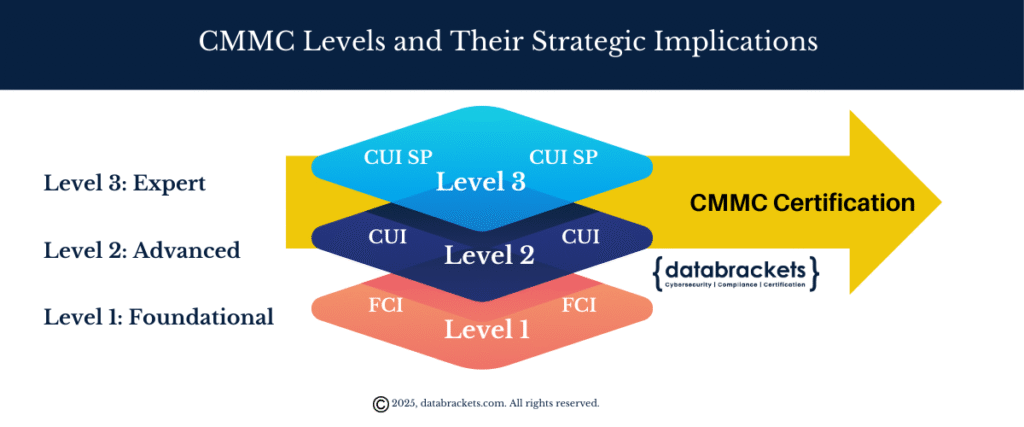
CMMC 2.0 streamlined the original five-level model into three levels, each aligned with specific types of information and risk profiles:
Level 1 (Foundational) focuses on protecting Federal Contract Information (FCI) and represents basic cyber hygiene practices. Organizations at this level demonstrate fundamental cybersecurity awareness and implement basic protective measures. While this might seem straightforward, many organizations discover gaps in their basic cybersecurity practices during assessment preparation.
Level 2 (Advanced) addresses the protection of Controlled Unclassified Information (CUI) and requires implementation of all 110 security controls from NIST SP 800-171. This level represents the majority of DoD contracting requirements and requires organizations to demonstrate both technical implementation and process maturity.
Level 3 (Expert) is designed for organizations handling the most sensitive unclassified information and requiring protection against Advanced Persistent Threats (APTs). This level includes 24 additional controls from NIST SP 800-172 and requires the highest level of process maturity and organizational capability.
Understanding which level applies to your contracts is crucial for strategic planning and resource allocation. Many organizations assume they need Level 2 certification when Level 1 might be sufficient for their current contracts, while others underestimate their requirements and find themselves unprepared for higher-level certifications.
The Critical Distinction between Compliance and Certification
Understanding the fundamental difference between CMMC compliance and certification is essential for navigating the professional landscape and selecting appropriate service providers. These represent two distinct phases of your CMMC journey, each requiring different types of professionals with specific qualifications.
The timing distinction is crucial—you must achieve compliance before pursuing certification. Compliance preparation typically takes 6-18 months depending on your starting point, while the certification assessment itself takes 2-6 weeks. This sequential relationship means strategic planning is essential for meeting contract deadlines.
Perhaps most importantly, the same professionals cannot help the same client with both phases, even if they hold all the necessary credentials and training. This independence requirement prevents conflicts of interest and ensures objective assessment. A consultant who helps you implement security controls cannot later assess whether those same controls meet CMMC requirements. Similarly, a C3PAO that conducts your certification assessment cannot have previously provided implementation guidance to your organization and if you fail to meet a control requirement, they cannot guide you how to meet it.
During the compliance phase, several organizations prefer to work with professionals who are trained in both processes and can guide them about the type of evidence, documentation etc. that is expected during certification.
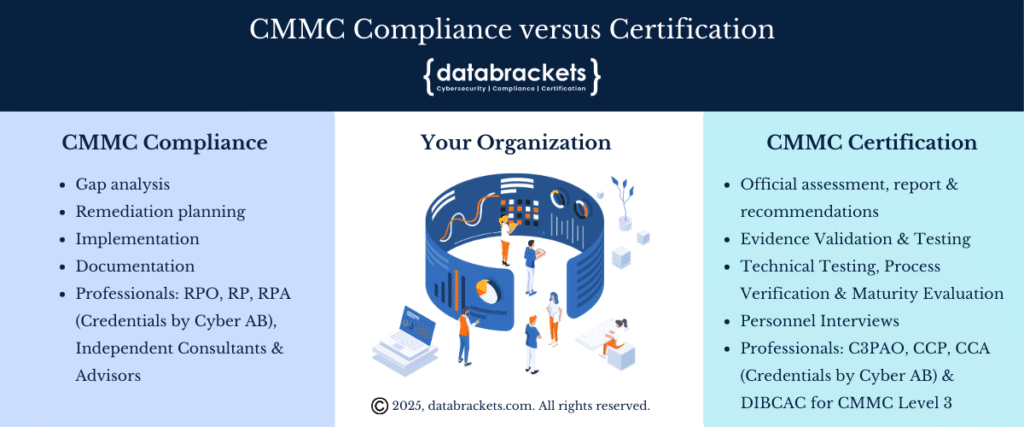
CMMC Compliance
The compliance phase represents the preparatory work necessary to implement CMMC requirements and achieve organizational readiness for certification assessment. This phase focuses on:
- Gap analysis
- Remediation planning
- Implementation
- Documentation development
During compliance preparation, organizations work to implement the necessary cybersecurity practices and processes defined in NIST SP 800-171 (for Level 1 & 2) and 24 additional controls of NIST SP 800-172 for Level 3. This phase includes both technical implementation and process development, creating the foundation that will eventually be assessed during certification.
Professional Roles in CMMC Compliance
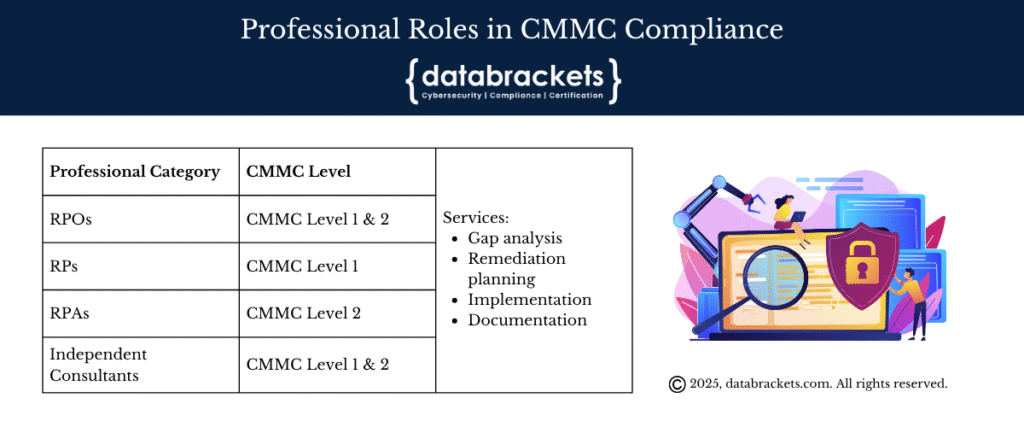
The CMMC compliance phase involves several categories of professionals, each with different standards, levels of qualifications, and accountability. Understanding these distinctions is essential for organizations building their CMMC strategy and selecting appropriate service providers for the preparation phase.
Registered Provider Organizations (RPOs) operate under formal standards and requirements from the CMMC Accreditation Body (CyberAB). Personnel within RPOs include Registered Practitioners (RPs) and Registered Practitioners – Advanced (RPAs), who hold individual credentials issued by CyberAB after completing required training programs. These professionals cannot conduct official certification assessments. Some RPAs also hold industry certifications such as CISSP, CISM, CISA, or experience with NIST frameworks.
RPOs must meet stringent qualification requirements and maintain ongoing compliance with program standards, providing CMMC compliance clients with assurance of quality and accountability that independent consultants cannot offer.
Authorized Services by RPOs: Gap analysis, remediation planning, implementation support, policy development, training, and hands-on technical assistance. The scope of RPO services includes everything necessary to prepare organizations for CMMC certification, from initial gap analysis through final readiness validation.
RPO Deliverables:
CMMC Readiness Assessment including gap analysis and remediation plans
Policy and procedure documentation
Implementation guides and training materials
Technical implementation support
RPO deliverables include comprehensive readiness assessments that evaluate organizational preparedness for formal CMMC assessment. These assessments provide detailed findings and recommendations for final preparation activities, backed by CyberAB’s formal standards and quality standards.
Implementation documentation prepared by RPOs includes policies, procedures, and technical configuration guides tailored to specific organizational needs and CMMC requirements. Training programs developed by RPOs address both technical implementation and process management aspects of CMMC compliance, ensuring organizational readiness extends beyond just technical controls.
Registered Practitioners (RPs) – CMMC Compliance Level 1
Registered Practitioners (RPs) are individual professionals who have completed CyberAB training and registration to provide CMMC compliance consulting services. They deliver all services required to meet Level 1 compliance requirements. RPs cannot provide services for CMMC Level 2 or higher, which require more specialized expertise.
RPs can work independently or as employees of RPOs, providing specialized expertise in CMMC preparation and implementation for Level 1 only. They must maintain their registration through ongoing education and compliance with CyberAB standards.
Registered Practitioner Advanced (RPA) – CMMC Compliance Level 2
Registered Practitioners – Advanced (RPAs) are authorized to provide more comprehensive services than standard RPs. They can assist organizations with the complex aspects of CMMC Level 2 compliance, including advanced security controls, sophisticated system architectures, and the detailed documentation and process requirements associated with protecting Controlled Unclassified Information (CUI). They provide comprehensive gap assessments, advanced remediation planning, complex policy development, specialized training, and detailed readiness validation for CMMC Level 2 requirements.
Important Limitations: Despite their advanced qualifications, neither RPs nor RPAs can conduct official CMMC assessments or issue certifications. These activities are reserved for CMMC Certified Assessors (CCAs) working within authorized C3PAOs during the certification phase.
Independent CMMC Consultants and Advisors
Independent CMMC consultants represent a broader category of compliance professionals. They typically possess extensive cybersecurity experience, often including backgrounds in information security, risk management, compliance, or related fields. Many hold industry certifications such as CISSP, CISM, CISA, or experience with NIST frameworks. Unlike RPOs, independent consultants are not required to hold specific CMMC credentials or meet CyberAB standards. This flexibility means clients must conduct their own due diligence regarding consultant qualifications and capabilities.
Services: Gap analysis, remediation planning, implementation support, policy development, training, and hands-on technical assistance with variable methodologies.
Key Deliverables:
Gap analysis reports and remediation plans
Policy and procedure documentation
Implementation guides and training materials
Technical implementation support
Clients need to be mindful that methodologies used may vary significantly between consultants.
CMMC Compliance Professionals – Timelines and Cost | ||
Professional Category | Timeline | Estimated Cost |
RPOs | 2-24 months | $10,000-$100,000+ |
RPs | 2-6 months | $3,000-$20,000 |
RPAs | 6-24 months | $30,000-$120,000+ |
Independent Consultants | 6-24 months | $35,000-$130,000+ |
Disclaimer: Timelines vary significantly based on organizational size, cybersecurity maturity, and complexity. Small organizations with basic requirements may achieve Level 1 compliance in 2-6 months, while Level 2 compliance typically requires 6-24 months for most contractors due to the 110 NIST SP 800-171 controls. Large enterprises or organizations with complex legacy systems may require extended timelines regardless of CMMC level. Costs depend on your current security posture, scope of remediation required, and whether internal resources or external consulting is used.
CMMC Certification: Third-Party Validation
The certification phase transforms months of compliance preparation into a formal evaluation that determines whether your organization can compete for defense contracts. Unlike self-directed compliance work, certification involves independent professionals who must maintain strict objectivity while validating your cybersecurity implementations. Certification is not a one-time event but an ongoing responsibility requiring maintenance of the organization’s cybersecurity posture between triennial assessments.
This high-stakes process operates through a carefully structured ecosystem where different professionals have distinct roles, specific deliverables, and absolute boundaries on what they can and cannot provide. While some CCPs and CCAs are allowed to offer consulting and compliance services, they are not authorized to offer them to a client whom they may be assessing for certification.
The Certification Ecosystem Structure
CMMC certification operates through a three-tier professional hierarchy designed to ensure qualified oversight while providing career advancement pathways. It consists of Lead CMMC Certified Assessors (Lead CCAs), CMMC Certified Assessors (CCAs), and CMMC Certified Professionals (CCPs).
Assessment Authority Flow:
- Lead CCAs: Oversee entire assessment processes and team leadership
- CCAs: Conduct full Level 1 & 2 assessments with final determination authority
- CCPs: Support assessments by verifying Level 1 practices only under CCA supervision
Critical Independence Principle: All certification professionals are absolutely prohibited from providing compliance consulting, implementation guidance, or remediation services to organizations they assess. This separation ensures objective evaluation and prevents conflicts of interest. However, they can offer consulting and implementation to organizations that they do not assess for CMMC certification.
Professional Roles in CMMC Certification
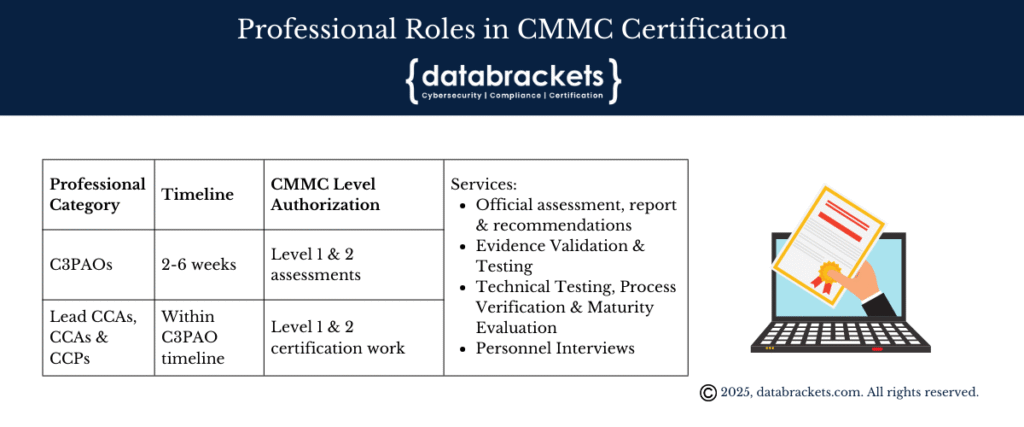
CMMC Third-Party Assessment Organizations (C3PAOs)
C3PAOs represent the cornerstone of the CMMC certification ecosystem. These organizations are authorized to conduct official CMMC assessments and issue certifications. The C3PAO designation requires extensive qualification to ensure assessment quality and consistency.
Organizational Qualifications for C3PAOs
C3PAOs must demonstrate significant cybersecurity assessment experience, including experience with frameworks similar to CMMC. They must show proven capability in conducting complex cybersecurity assessments and managing multi-week engagement projects.
Quality management systems are mandatory for C3PAOs, including standardized assessment methodologies, quality control processes, and continuous improvement programs. These systems ensure consistent assessment quality across different engagement teams and time periods.
Personnel requirements include employing sufficient numbers of qualified CCAs to support the organization’s assessment volume. C3PAOs must maintain appropriate staffing levels and expertise areas to serve their client base effectively.
Overview of a C3PAO’s CMMC Assessment Team for Level 2
One Lead CCA (mandatory for team leadership)
At least one additional CCA (for assessment depth)
Optional CCPs for support roles under supervision
CMMC Quality Assurance Professional for validation
Assessment Methodology:
Interview: Personnel discussions across organizational hierarchy
Examine: Documentation review and evidence validation
Test: Technical control functionality verification
Certification Outcomes and Implications
Final Status: All 110 practices meet requirements – full certification achieved
Conditional Status: 80%+ score (88+ practices MET) with POA&M for non-critical gaps
Not Achieved: Below 80% score – certification denied, reassessment required
POA&M Restrictions:
Only available for non-critical controls (weights 1-2)
Critical controls (weights 3-5) must be fully implemented during assessment
180-day remediation timeline for conditional certification
C3PAO conducts focused closeout assessment after remediation
The certification ecosystem ensures objective evaluation while maintaining clear professional boundaries. Organizations must understand these roles and limitations to navigate the assessment process effectively and achieve successful CMMC certification.
C3PAO Deliverables
The primary deliverable from C3PAOs is the official CMMC assessment report, which documents assessment findings and supports certification decisions. This report becomes part of the official record for the organization’s CMMC certification.
Certification recommendations represent another key deliverable, with C3PAOs providing formal recommendations about whether organizations should receive CMMC certification based on assessment findings. These recommendations cannot include remediation measures if any critical control is not performing at the required maturity level. POA&M’s may be planned & implemented for non-critical controls before the certification is issued.
Primary Assessment Outputs:
Official CMMC assessment report documenting all findings and evidence
Final Findings Briefing summarizing MET/NOT MET status for each practice
Certification recommendations (Conditional, Final, or Not Achieved status)
Assessment results package submission to DoD’s eMASS system
Certificate of CMMC Status based on assessment outcomes
Can C3PAOs Explain Their Recommendations? Yes, C3PAOs are allowed and expected to explain their findings clearly and provide clear communication throughout the assessment process. However, there are strict limitations on what they can explain:
What C3PAOs CAN Explain:
Why specific practices were scored as MET or NOT MET
What evidence was insufficient or missing
Which controls are critical vs. non-critical
Assessment methodology and scoring rationale
What C3PAOs CANNOT Provide:
Specific remediation advice or guidance on how to fix deficiencies
Implementation recommendations for failed controls
Consulting services on how to resolve issues that disqualified certification
POA&M (Plan of Action & Milestones) Role: C3PAOs can
Identify which controls are eligible for POA&M placement
Explain the POA&M process and 180-day remediation timeline
Describe critical vs. non-critical control distinctions
Cannot provide: Specific remediation strategies or implementation guidance
Timeline: 2-6 weeks for complete assessment activities
Lead CMMC Certified Assessors (Lead CCAs)
Senior assessment professionals holding the highest tier of CMMC credentials, providing team leadership and oversight for complex evaluations.
Qualifications: Must hold CCA credentials in good standing, possess 5+ years cybersecurity experience, 5+ years management experience, 3+ years assessment/audit experience in leadership roles, and DoD certifications at Advanced Proficiency Level per Manual 8140.03 including credentials such as CISSP with relevant concentrations, SABSA, CISM with advanced specializations, or other expert-level certifications that demonstrate senior cybersecurity leadership competency.
Level Authorization: Level 1 & 2 assessment leadership with comprehensive team oversight authority
Leadership Responsibilities & Deliverables: Lead CCAs coordinate the entire assessment processes, ensure quality and consistency across assessment teams, provide technical leadership for complex scenarios including resolving complex issues, and serve as primary points of contact with C3PAO management.
Enhanced Deliverables:
Assessment team leadership and strategic coordination with assessed organizations
Senior oversight of complex technical evaluations
Final certification recommendations to C3PAO leadership
Quality assurance for comprehensive assessment processes
Mentorship and professional development of junior assessment team members
Resolution of complex assessment challenges and edge cases
Assessment appeals and dispute resolution leadership
Timeline: Responsible for overall 2–6-week assessment timeline management
CMMC Certified Assessors (CCAs)
CCAs are core assessment professionals holding credentials that authorize them to conduct full Level 2 evaluations and make final certification determinations.
Qualifications: Must first hold CCP credentials, demonstrate 3+ years cybersecurity experience and 1+ year assessment/audit experience, complete 3 assessments as team members under supervision, pass 150-question examination (4 hours, 500+ score required), and maintain favorable background investigations.
DoD Certification Requirements: CCAs must hold Department of Defense certifications per DoD Manual 8140.03 at the Intermediate Proficiency Level, which includes credentials like CISSP, CISM, GCIH, or other approved certifications that meet DoD cybersecurity workforce standards. These requirements ensure assessors possess recognized expertise beyond the basic CCP credential.
Level Authorization: Full Level 1 & 2 assessment authority with final determination capabilities
Timeline: Within C3PAO assessment timeline
CCA Responsibilities: CCAs possess the authority to make binding assessment decisions, lead portions of assessment activities, and serve as the primary interface between assessment teams and organizations seeking certification (OSCs).
CCA Deliverables:
Complete Level 1 & 2 practice assessments
Final scoring determinations and recommendations
Evidence validation and technical testing oversight
Personnel interviews and process evaluation
Comprehensive assessment documentation
CMMC Certified Professionals (CCPs)
They are entry-level assessment professionals with carefully defined participation boundaries in the certification process.
Qualifications: Must complete training through CyberAB-approved providers, pass a 170-question examination (3.5 hours, 500+ score required), hold a college degree in cybersecurity/IT field or demonstrate 2+ years equivalent experience, and maintain favorable Tier 3 background investigation for DoD assessments. They are also required to complete their CompTIA A+ certification or have equivalent knowledge or experience and complete DoD’s CUI Awareness Training.
Level Authorization: Level 1 self-assessments (independent) and Level 2 assessments (Level 1 practices only, under CCA supervision)
Key Limitation: CCPs cannot assess Level 2-specific practices or make final assessment determinations. They may only verify Level 1 practices during Level 2 assessments while working under direct CCA oversight, ensuring appropriate supervision while gaining practical experience.
CCP Deliverables:
Level 1 practice verification and documentation
Evidence collection support and organization
Assessment documentation assistance
Interview support and basic technical testing
Team member contributions under CCA supervision
Timeline: Embedded within C3PAO assessment schedule
Looking Forward: The Future of CMMC
The CMMC program continues to evolve, with ongoing refinements to requirements, processes, and implementation guidance. Organizations should stay current with program developments and maintain flexibility in their approach to CMMC compliance.
Future developments may include additional assessment options, refined requirements, and expanded scope. Organizations that build strong foundational capabilities will be better positioned to adapt to these changes.
The broader trend toward cybersecurity verification and third-party assessment extends beyond DoD contracting. Organizations that invest in CMMC capabilities may find these investments valuable for other regulatory requirements and business opportunities as well.
How databrackets can help you with CMMC Compliance
At databrackets, we bring over 12 years of proven expertise in helping organizations achieve compliance with the most rigorous cybersecurity and data privacy standards like ISO 27001, SOC 2, HIPAA, NIST SP 800-53, NIST Cybersecurity Framework, NIST SP 800-171, etc. We specialize in transforming CMMC compliance from a daunting obstacle into a strategic business enabler.
Our Comprehensive Service Portfolio includes
Readiness & Implementation Support:
Network Architecture Documentation and CUI Flow Diagrams
CUI System Boundary Definition and FIPS Validation Documentation
Shared Control Matrix Development and SSP Creation
Customized Policies, Procedures, and Data Breach Response Plans
Vulnerability Assessment Reports and Vendor Compliance Assessments
Advisory Services and Audit Support:
Customized CUI Awareness Training Programs
Specialized Policy and Procedure Development
Assessment Preparation and Mock Certification Activities
Ongoing Compliance Maintenance and Regulatory Monitoring
Our Proven Track Record
Our team of security experts has successfully supported organizations across diverse industries in aligning their processes with security frameworks, including SOC 2, HIPAA, 21 CFR Part 11, NIST SP 800-53, NIST Cybersecurity Framework, NIST SP 800-171, GDPR, CMMC, etc. We are an authorized certifying body for ISO 27001.
Author: Aditi Salhotra, Digital Marketing and Business Development, databrackets.com
Aditi is a Digital Marketing and Business Development Professional at databrackets.com. She graduated with honors in Marketing from Sheridan College, Canada. In addition to her current profile, she contributes to Product Development and Content Creation. She is a strong advocate of Good Cyber Hygiene and white hat SEO techniques. She is proud of the company’s mission to safeguard organizations from cyber threats and ensure their business continuity in adverse situations.
Technical Expert: Srini Kolathur, Director, databrackets.com
The technical information presented in this blog has been carefully reviewed and verified by our Director, Srini Kolathur. Srini is results-driven security and compliance professional with over 20 years of experience supporting, leading, and managing global IT security, compliance, support, and risk assessment in fortune 100 companies. Some of his key areas of focus are SOC 2, ISO 27001, NIST 800-171, NIST 800-53, NIST Cybersecurity Framework, HIPAA, Security Risk Assessment, CMMC 2.0 among others. He is a CMMC Registered Practitioner (RP), CISSP, CISA, CISM, MBA. He is active in several community groups including Rotary International and TiE.